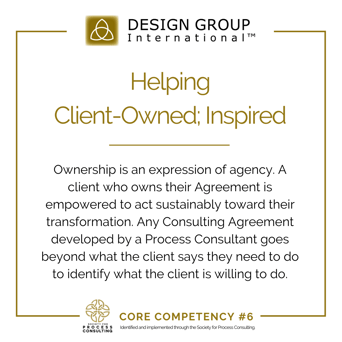
Ownership over buy-in
Has there ever been a word that you disliked so much that you wished you could erase it from everyone’s vocabulary? If I had that superpower, I would permanently delete the term “buy-in.”
“Buy-in” connotes passive support or participation in a vision or a plan or a process developed by someone else. There is nothing active, enthusiastic, committed or passionate about “Buy-in”.
I prefer the powerful concept of “ownership.” As David Gurteen writes, “Ownership is when you own or share the ownership of an idea, a decision, an action plan, a choice. It means that you have participated in its development; that it is your choice freely made. Buy-in is the exact opposite.”
A few months ago, a potential Client contacted me about some “discord” and “displeasure” in their organization. They wondered if I could work with them in doing some mediation. I met with their leadership team. As they learned more about mediation, they came to the realization that mediation, with its emphasis on problem-solving a specific situation, was not the best fit for their context. They appointed an ad hoc team in planning next steps.
The ad hoc team had all the contextual knowledge, cultural expertise, organizational history, and analytical ability necessary to plan the next steps. My part in the co-creative process was to ask the open-ended questions that allowed the team to define their purpose, what they wanted to achieve, and what approaches would work best in their context.
They decided to deepen their understanding of the organization by offering a survey, two listening sessions, and an option for a personal conversation for anyone that wanted it. Over the next two months as each activity unfolded, the ad hoc team met with me to debrief what had happened so far and to make adaptive changes for the next planned activity or event.
After two months, the full leadership team spent most of a day in a retreat to go over the data and to plan action steps. The team members had done their own homework. They had read pages and pages of raw data, sorted responses into themes, read a summary of the data compiled by a small working group, participated in the listening sessions, and had documented their follow-up conversations.

As a Process Consultant, my part was to create the container that would allow a group of 13 people to effectively process the narrative data that they had gathered. We used the What? So What? Now What? exercise from Liberating Structures to guide the process.
By working first alone, and then in a variety of groupings, each person actively engaged in the process of analyzing the data and planning action steps to address the root causes of the challenges in their larger organization. The creative ideas of the leadership team were documented on large sheets of paper so everyone could see them and photograph them to take along. Although I facilitated the retreat, I spoke only about 20% of the time. The work belonged to the people who generated the ideas, decisions, and action plans that day. They owned their plan because they all had a part in creating it. The changes they planned did not require “buy-in” from the larger organization, because most of the changes had to do with how the leadership team themselves would lead.
The Society for Process Consulting states, “Ownership is an expression of agency. A client who owns their Agreement is empowered to act sustainably toward their transformation.”
As Process Consultants, we see Clients as “the captains of their fate and the masters of their soul”. Clients steer their own process and determine their outcomes. A Process Consultant comes alongside, and never grabs the pen as the Client writes their story.
To helping you write your story,
/Jeanne%20Zimmerly-Jantzi%20Headshot%20(300x300).png?width=86&name=Jeanne%20Zimmerly-Jantzi%20Headshot%20(300x300).png) Jeanne Zimmerly Jantzi
Jeanne Zimmerly Jantzi
Design Group International
Senior Consultant
The core competencies of process consulting have been developed and are taught by the Society for Process Consulting. If you are interested in receiving your credential in process consulting please visit our website.
Photo by Claudio Schwarz on Unsplash
/Jeanne%20Zimmerly-Jantzi%20Headshot%20(300x300).png)
June 15, 2022

Comments